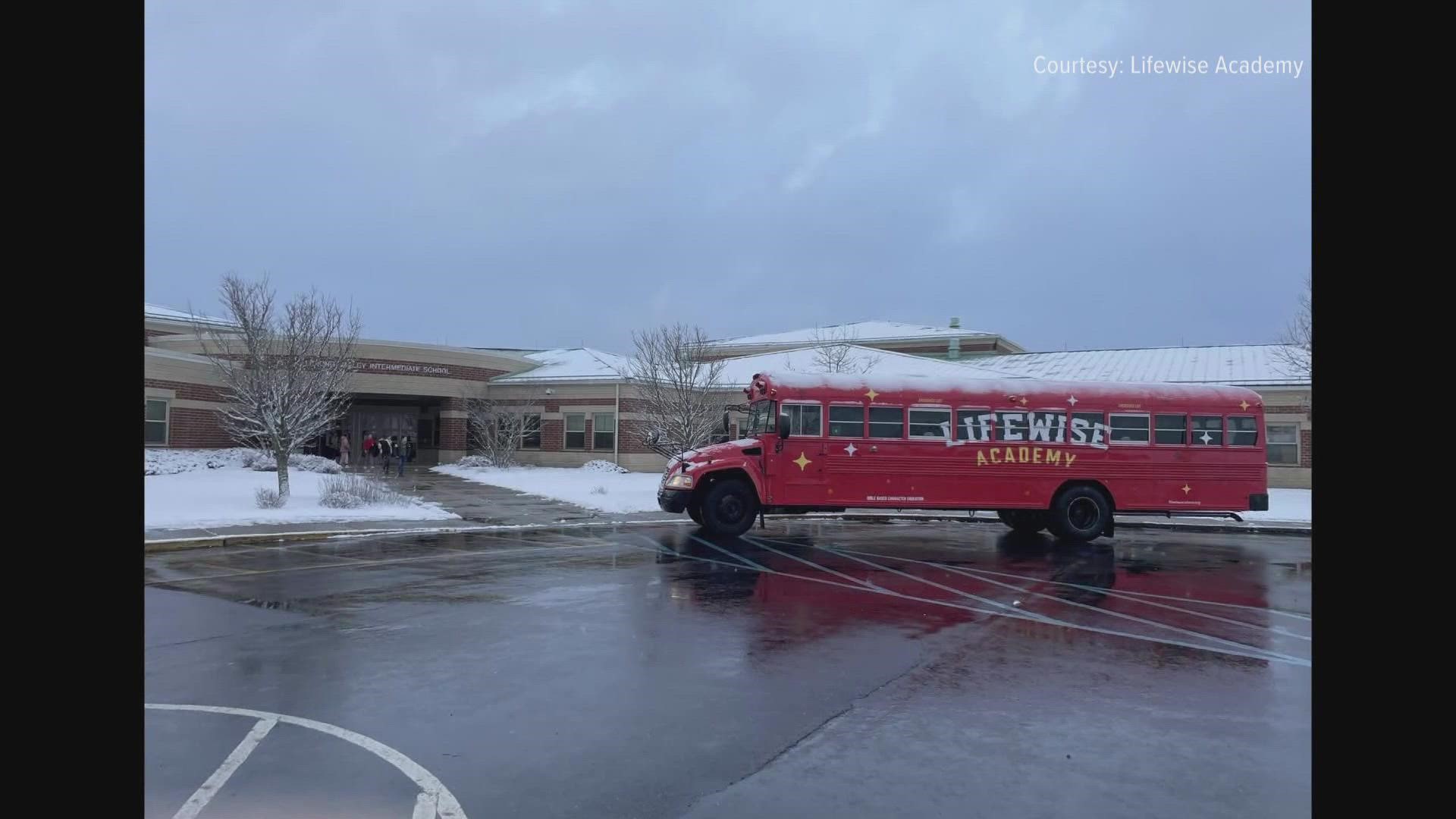COLUMBUS, Ohio — The bus is hard to miss. It’s bright red and will transport Licking Valley Intermediate School students down the road to a local church for Bible-based instruction.
The bus is from LifeWise Academy, a non-profit program that started operating in the Licking Valley Local Schools this week.
“Hand and glove with our intermediate school principal, she was okay with it, I was okay with what they needed to do, obviously our school attorney reviews everything, and then the board actually did take a vote to allow this to go forward after a lot of discussion,” said Licking Valley Superintendent Scott Beery.
The program is allowed because of a 1952 U.S. Supreme Court decision, which paved the way for a 2014 Ohio law allowing for Released Time Religious Instruction, or RTRI.
Individual school districts must approve their own specific programs, and Beery said the Licking Valley school board did that back in 2016. But it wasn’t until this past summer when the work to create the LifeWise program in his district really began. It finally kicked off this week.
Beery said roughly 90 third, fourth and fifth graders will travel by bus to a nearby church each Monday to receive Bible-based instruction for 45 minutes.
But, as a leader in public education, he has some concerns. He makes it clear, however, that those concerns have nothing to do with religion.
“As a superintendent, I don’t want them leaving for any reason,” he said of his students. “I want them here every day, from start to finish, and that’s K-12.”
State law requires that students receive this education off school property and that they not miss any core curriculum classes. They also must have parent permission, and the programs have to be privately funded.
“I would rather them stay here and that the religious instruction would take place before school, after school, Bible study, Fellowship of Christian Athletes, and those types of things,” Beery said. “With that said, I also respect parental choice. And just because I as a parent wouldn’t make the decision for my kids to do this, this is right for some parents and those kids. I respect that completely.”
Jessica Cappuzzello has three children, two of whom attend LifeWise Academy in New Albany. She defends the program happening during school hours, arguing that it provides more access to students who might otherwise not be able to find transportation to and from the program.
“I was really excited that this could happen during the school day because it just reiterates things that they’re learning, not only at home, but also at a Sunday at church,” she said.
Cappuzzello said her sons are excited to attend LifeWise and have learned lessons that build character. They attend for a week at a time, roughly once a month, and miss technology class when doing so.
“I think what they’re gaining in Lifewise outweighs what they’re missing,” she said.
Cappuzzello also points out that she goes over what her sons miss with them at home and that they already excel at technology.
“During the school day gives an opportunity for anyone to be able to be a part of it, whether or not you do have a faith background or not,” she said.
But that’s a concern for Scott DiMauro, president of the Ohio Education Association, the state teachers union.
“Districts really need to be very careful to make sure that you’re not putting students who really aren’t fully vested in doing this in a position where they’re going to be stigmatized for choosing not to,” he said.
DiMauro worries about the perception of students choosing not to take part in such programs and whether they might feel pressured to join because of that. He also worries about the instruction they’ll miss at school. While students cannot miss any core classes, such as English or math, they can miss out on music, art or physical education.
“If students are missing academic instruction, in some places, maybe it’s art or music, non-tested subjects but still instruction that’s part of the curriculum in order to do this, then we’re shortchanging students in those cases, taking away opportunities to give them the full, well-rounded and rich curriculum they need and deserve,” he said.
Joel Penton, the founder and CEO of LifeWise Academy, said offering this type of programming is only enhancing a student’s education.
“To send a child to school and give them 30 hours of content a week but then to have zero mention of something spiritual is not a neutral message to that child,” he said. “I mean, it tells the child that this spiritual aspect is not important. And so, giving parents just the option to incorporate a 45-minute class into their child’s week, we believe is important. And a lot of parents are taking us up on that.”
In fact, Penton said, by the end of this school year, LifeWise Academy will be operating in more than 130 school districts, within Ohio and several other states, serving nearly 15,000 students.
“It’s a beautiful manifestation of the separation of church and state,” he said. “You know, students literally leave the public school, they’re physically separated from the public school to receive this religious instruction, and it doesn’t infringe upon the school day of students who don’t participate.”
Penton described the curriculum as taking students through the Bible during the course of five years. While the program is Christian-based, it is not focused on any one denomination. And he points out that there is no cost to students, which removes any financial barriers from students who might want to attend but otherwise could not.
“I think it’s important to leave it up to the parent,” he said. “If a parent says, you know, I would want my kid to receive Bible education over this other non-core class, I mean, who am I to say, who are you to say. Ultimately it’s up to that parent to make that decision.”

